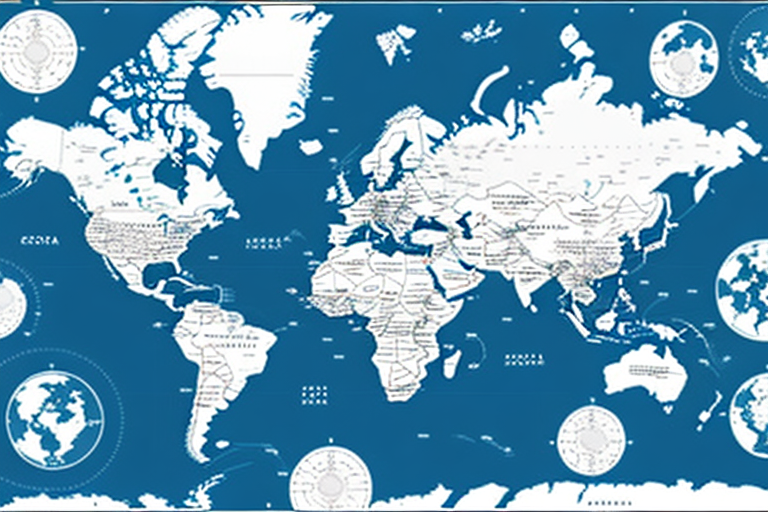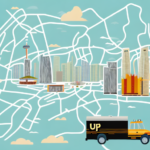The History of DHL: From a Small Courier Service to a Global Logistics Powerhouse
DHL was founded in 1969 by Adrian Dalsey, Larry Hillblom, and Robert Lynn, originally operating as a courier service specializing in transporting documents and small parcels by air freight between San Francisco and Honolulu. The name DHL is derived from the initials of the founders' last names.
Over the decades, DHL expanded its services globally, establishing major cargo hubs in cities like Cincinnati and Singapore, and opening its first office in Japan. A significant milestone in its growth was the acquisition of Airborne Express in 2002, which significantly bolstered its presence in the American market.
Today, DHL is recognized as a global logistics leader, operating in over 220 countries and territories with a diverse range of services including express delivery, freight transportation, supply chain management, and e-commerce fulfillment. The company's commitment to innovation and sustainability has positioned it at the forefront of the logistics industry.
DHL's Global Reach: A Look at Their Network and Operations Around the World
With a workforce exceeding 380,000 employees and more than 4,000 facilities worldwide, DHL maintains an extensive global network that facilitates efficient logistics operations across continents. Their comprehensive services range from express shipping to freight transportation, making them a dominant player in both developed and emerging markets, particularly in Asia and Africa.
DHL's robust network includes advanced air and ground transportation systems, state-of-the-art warehouses, and strategically located distribution centers. This infrastructure enables seamless logistics solutions tailored to diverse business needs.
In recent years, DHL has intensified its focus on sustainability, implementing initiatives such as the use of alternative fuels and optimizing transportation routes to reduce carbon emissions. Additionally, the company has pioneered the integration of cutting-edge technologies like drones and autonomous vehicles to enhance delivery efficiency and customer satisfaction.
DHL's Market Share: How They Stack Up Against Competitors in the Logistics Industry
DHL holds a significant position in the global logistics market, competing with industry giants like FedEx, UPS, and Amazon. According to Statista, as of 2023, DHL commands approximately 14% of the global courier, express, and parcel (CEP) market, making it the third-largest player behind UPS and FedEx.
Expanding beyond the CEP sector, DHL has diversified into freight forwarding, supply chain management, and integrated logistics solutions, reinforcing its status as the world's largest logistics company. This diversification allows DHL to serve a wide range of customers, from small enterprises to multinational corporations, enhancing its market resilience.
DHL's Revenue and Financial Performance: An Analysis of Their Earnings and Growth
DHL has demonstrated consistent financial growth, reporting a revenue of approximately €85 billion in 2023, up from €63.3 billion in 2020. The company's net profit margin has remained robust, reflecting effective cost management and strategic investments in technology and infrastructure.
One of the primary drivers of DHL's financial success is its relentless focus on innovation and technology. Investments in automated systems, robotics, and digital platforms have streamlined operations, reduced costs, and enhanced the customer experience. For instance, DHL's advanced online shipment tracking and mobile applications provide real-time updates, increasing transparency and reliability for clients.
Despite challenges posed by the COVID-19 pandemic, DHL maintained steady growth by adapting to increased e-commerce demand and optimizing its supply chain operations. The company's strategic acquisitions and expansion into new markets have also contributed to its sustained financial performance.
The Role of Technology in DHL's Success: How They Leverage Innovation to Stay Ahead
Technology has been a cornerstone of DHL's strategy to maintain its competitive edge. The company has integrated automation and robotics into its warehouses, enhancing efficiency and reducing human error. Additionally, DHL employs blockchain technology to improve transparency and security within its supply chains, ensuring data integrity and traceability.
Artificial Intelligence (AI) plays a pivotal role in DHL's operations, from route optimization and predictive maintenance to customer service enhancements. AI-driven analytics enable DHL to make data-informed decisions, optimizing delivery routes, forecasting demand, and personalizing customer interactions.
Furthermore, DHL is exploring the use of drones and autonomous vehicles to revolutionize last-mile delivery. These technologies not only increase delivery speed but also reduce operational costs and environmental impact.
DHL's Sustainability Efforts: Environmental Initiatives and Social Responsibility Programs
DHL is committed to leading the logistics industry in sustainability, aiming for zero-emission logistics by 2050 through its GoGreen initiative. This program focuses on reducing carbon emissions, utilizing alternative fuels, and enhancing energy efficiency across all operations.
- Carbon Reduction: DHL has set a target to reduce its carbon emissions by 30% by 2025, compared to 2007 levels. This includes investments in electric vehicles and the installation of solar panels at facilities.
- Waste Management: The company implements comprehensive waste reduction strategies, including recycling programs and minimizing packaging materials.
- Sustainable Sourcing: DHL prioritizes sustainable sourcing of materials and partners with suppliers who adhere to environmental standards.
In addition to environmental initiatives, DHL emphasizes social responsibility through programs that support local communities and promote diversity and inclusion. Initiatives such as the Global Volunteer Day allow employees to contribute to community projects, while leadership programs aim to increase representation of women in management roles.
For more information on DHL's sustainability efforts, visit their Sustainability Page.
DHL's Supply Chain Solutions: A Breakdown of Their Services for Businesses of All Sizes
DHL offers comprehensive supply chain solutions tailored to the needs of businesses ranging from startups to large enterprises. Key services include:
- Warehousing and Distribution: State-of-the-art warehousing solutions with inventory management systems that ensure efficient storage and distribution of goods.
- Freight Transportation: Multi-modal transportation options, including air, sea, and road freight, to facilitate global trade.
- Customs Clearance: Expertise in navigating complex international trade regulations to ensure smooth cross-border transactions.
- E-commerce Fulfillment: Specialized services for online retailers, including order processing, packaging, and last-mile delivery.
DHL also provides industry-specific solutions for sectors such as healthcare, automotive, and aerospace. For example, their healthcare logistics services include temperature-controlled transportation and secure storage for pharmaceuticals and medical devices.
Commitment to sustainability is integrated into DHL's supply chain solutions, offering eco-friendly transportation options and implementing energy-efficient practices in warehouses and distribution centers.
DHL's Impact on International Trade: How They Facilitate Global Commerce and Connectivity
DHL plays an essential role in facilitating international trade by providing reliable and efficient logistics services that help businesses navigate the complexities of global commerce. Their expertise in customs clearance and regulatory compliance ensures that goods move smoothly across borders, reducing delays and enhancing trade efficiency.
The company's extensive network and innovative supply chain solutions enable businesses to expand into new markets with confidence. By offering comprehensive logistics support, DHL helps companies overcome barriers to entry and reach a broader customer base, thereby driving global economic growth.
DHL's digital tools, such as real-time shipment tracking and data analytics, empower businesses to make informed decisions, optimize their supply chains, and improve overall operational efficiency. This not only benefits individual businesses but also contributes to the robustness of global trade networks.
For more insights into DHL's role in international trade, refer to the World Trade Organization reports.
The Future of DHL: What Lies Ahead for the Logistics Giant in a Rapidly Changing Industry
As the logistics industry undergoes rapid transformation driven by technological advancements and evolving market demands, DHL is strategically positioned to lead the way. The company's focus areas include:
- Technological Innovation: Continued investment in automation, AI, and sustainable technologies to enhance efficiency and customer experience.
- Sustainability: Achieving zero-emission logistics by 2050 through innovative green initiatives and sustainable practices.
- Market Expansion: Penetrating emerging markets and expanding service offerings in sectors like e-commerce, healthcare, and aerospace.
- Digital Transformation: Enhancing digital platforms and integrating advanced analytics to provide personalized and data-driven logistics solutions.
DHL is also exploring new business models and partnerships to adapt to the changing landscape of global trade. The integration of Internet of Things (IoT) devices, blockchain for enhanced security, and the adoption of green logistics are expected to play significant roles in shaping the future of the company.
With its unwavering commitment to innovation, sustainability, and customer-centric solutions, DHL is well-equipped to navigate the challenges of the logistics industry and continue its legacy as a global leader.






















